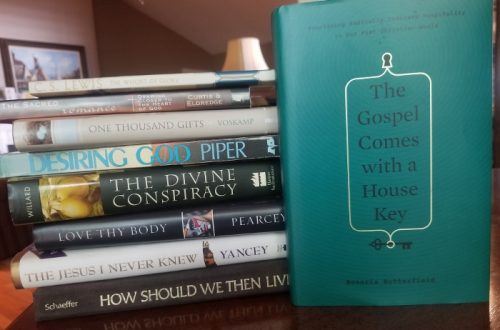Harvey and The Over-Spiritualization of Suffering
Hurricane Harvey pounded the gulf coast of Texas in an epic storm of biblical proportions. Five days since Harvey made landfall, over 13,000 people have required rescue, and over twenty have died. My entire immediate family lives in Houston. The six of them live in a subdivision in the city center, just minutes from areas that experienced catastrophic flooding. The school district has postponed the first day of school to September 5 (more than one week later than the scheduled start date). Based on the media coverage of Harvey, I feared my family would spend days stuck on the upper levels of their homes, if not worse. Yet their two homes received only ankle-deep garage flooding, with no water entering their living spaces. My brother described the past several days as a rare relaxing time home with the kids. Though grateful, I have marveled at how God created a family-quality-time indoor picnic for them, while many fellow Houstonians have experienced days of struggle and anguish. Maybe my stellar family deserves better than others. Nope.
Doubtless, many now cry out to a god they may or may not believe in, wondering why? And some evangelicals will try to over-spiritualize the suffering caused by Hurricane Harvey, blaming individual sin while failing to acknowledge the curse. Regardless of why it all happened, the church body must acknowledge and validate a sufferer’s right to feel frustrated. But Pastor J. S. Park says in church culture, “we beat up the broken people…we wrongly believe that suffering from depression is ‘immoral.’ We say that anxiety is ‘not trusting God.’ We say that ‘it’s wrong to doubt and ask questions.’ We say that sickness is ‘not enough faith’” (1 Pet. 4:16). Some evangelicals dub those struggling with sadness, fear, anxiety, anger, or doubt, as poor Christian witnesses. But Jesus would proclaim that withholding empathy and compassion for a fellow human’s suffering makes for a poor witness (John 13:34–35).
Even so, some Christians dub such devastation a divine “Sodom and Gomorrah” retribution upon people groups. But one must not assume God punishes specific people through natural disasters. Because sometimes suffering lies outside the bounds of cause and effect. Earthquakes, tsunamis, and hurricanes stem from the curse on creation due to the Fall. Calling such devastation God’s punishment is cruel and shortsighted. No one knows why God allows destruction of certain areas, while sparing others (1 Cor. 2:16). Tada and Estes in When God Weeps, put it well: “When hurricanes strike, it’s not irreligious for the National Hurricane Center to give a scientific explanation. . . . When accidents happen—it’s ok to call them accidents—even the Bible does.” Humans cannot comprehend the mysteries of God’s decisions.
Ecclesiastes 3:4 speaks of a time to weep and mourn. Yet the body of Christ oftentimes robs its members permission to cry out to God in agony. This leaves people either feeling guilty, or living in a “fake happy” denial of their struggles. Park employs absurdity to make the salient point: “When you have an entire Sunday service full of jumping and singing and hollering and flashy preaching, then the church is the last appropriate place for the grieving person. . . . [W]e’re mostly expected to . . . [eat] Scripture and [puke] praise.” Park adds, “While the Sunday church service is rocking it out with laser lights and fog machines and subwoofers, there are the disenchanted few in the back row who have sensed the cavernous underbelly of great evil.” For this reason, authentic lament ought to return to worship services (Rom. 12:15). The hurting should not get shuffled off to a place to regain wholeness before rejoining the pack. Sending them off for quarantine gives them the message that the congregation views them the same way the Pharisees viewed prostitutes and lepers. Jesus never expected people to hide sorrow, nor did he chastise expressions of agony. Jesus expressed the full range of emotions that the church community has dubbed sin. Likewise, people deserve the freedom to grieve the inevitables of life in a fallen world.
Anyone living long enough will experience suffering, regardless of where one falls on the righteousness scale. Churches must give sufferers permission to voice pain the same way Jesus did. Congregations should not only allow lament—they should encourage it—lest the word “sanctuary” prove contradictory.


